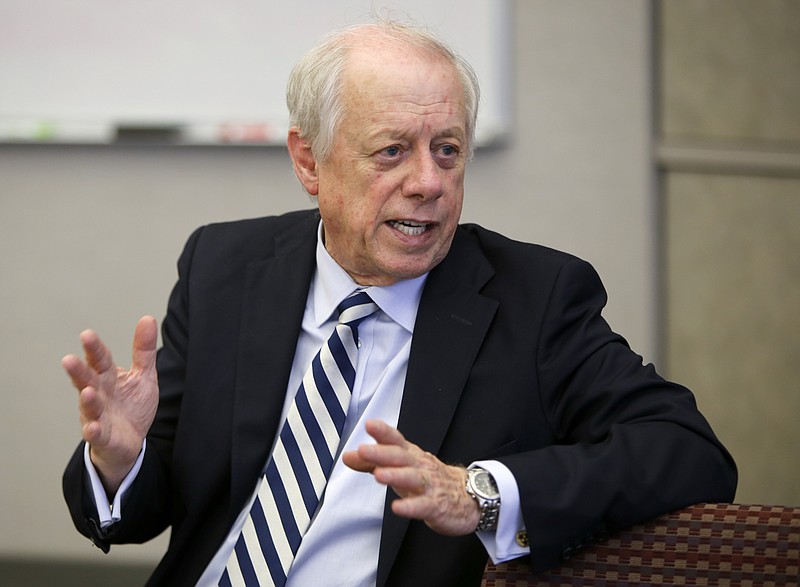Each week that passes, old statements surface or new comments are made proving Democrat Phil Bredesen - no matter what his campaign ads might say - has positions that run in contrast to those of most Tennesseans.
Principally, those positions have shown him to be a staunch opponent of President Donald Trump's tax cuts that have put more money in the wallets of state residents, a strong supporter of Planned Parenthood and abortion, and in favor of some type of government-supported universal health care system.
Evidently, the Bredesen campaign is so concerned about the health care charge that it sent out a Politifact article Friday that parsed words to state the candidate doesn't support single-payer health care. Unfortunately for him, the article doesn't exactly paint him as someone who opposes heavy federal government involvement in health care.
Indeed, it quotes a 2010 CSPAN interview with him in which he says, "Single-payer, the federal government collecting the money and then turning it over, I mean that's what I think actually we should do."
It's hard to be more direct than that.
But then Bredesen qualifies it: "Single-payer in the sense of Medicare, where government is collecting the money and then is paying all the claims, I think would be a disastrous direction for the country."
He says he had something else in mind.
What Bredesen's plan would do, according to the Politifact article, would still cover every American, and the federal government would still define what is and isn't covered. But care would be dispensed, he says, by provider networks called "systems of care." These networks would receive "a determined [federal] payment for each of its patients" and would be responsible "for the delivery, quality, coordination and payment for health care for those who belong to it."
Although employer health insurance would be gone, and in large part insurance companies, the networks would somehow compete for business with other systems of care in a specific geographical area. Everyone would have a voucher for "a standard basket of care" - paid for through payroll taxes - and could pick the network they liked best.
While Bredesen spelled out his plan in the 2010 book "Fresh Medicine," his 2018 campaign website doesn't specify his current feelings, if they have changed. But he allowed in June, he was "not for single-payer, particularly."
Whether it's Bernie Sanders' Medicare for All proposal, or Bredesen's 2010 archetype, the federal government is still collecting all of the money and making many of the decisions about care. Either way, it's taking more decisions out of patients' hands.
On Planned Parenthood and abortion, the former Tennessee governor tried to evade the question in a video captured in a town hall event at Rhodes College last week by saying he was "not making an issue of this in this campaign." However, he acknowledged he has "always been there" on supporting a woman's right to choose an abortion.
Queried on support for Planned Parenthood, given recent controversy over charges the organization sells parts of aborted fetuses, Bredesen first dodged by saying he is "fine" with the "funding for the non-abortion services that exist today."
"I have no problem with that whatsoever," he said.
Pressed on Planned Parenthood's abortion services, Bredesen owned up to his long-held belief: "Well, I don't have a problem with them doing it, and I have always been pro-choice."
He hasn't always been sure of federal funding for abortions, though. Indeed, in a 1987 interview, he said he opposed federal funding for them except in the cases of the health of the mother, rape, incest or "children with substantial development deformities such as Down's syndrome."
Bredesen's stance on Planned Parenthood is quite different from that of Senate opponent Marsha Blackburn, who led a House Select Investigative Panel on Infant Lives that some have said helped stop the sale of fetal tissue.
On the tax cuts, the Democrat previously doubled down on House Minority Leader Nancy Pelosi's reference of them as "crumbs," saying they were "a few crumbs to the middle class."
Only this month, he said they were "oversold" to the country and have had a minimal impact on declining employment figures, though that was never their aim. Their aim was to put more money in taxpayers' pockets and to give businesses more money in which to expand or give raises or bonuses, which they've done.
Bredesen has gone out of his way, in advertising and on the stump, to convince people he wouldn't be a clone of Democratic Senate Minority Leader Chuck Schumer of New York, but little by little he's doing a good job of convincing conservative and moderate Tennesseans that that's exactly what he'd be.
